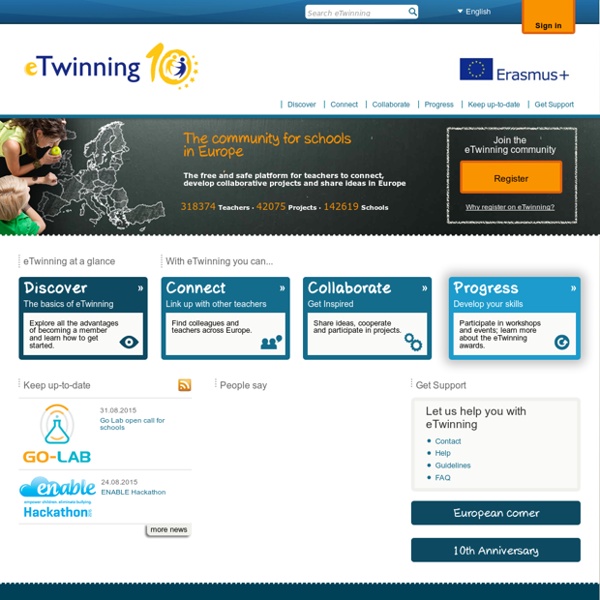



http://www.etwinning.net/en/pub/index.htm
eTwinning per una didattica sostenibile - 2012 Portare video in classe non è una novità. La videocamera già più stimolante richiede di attivarsi, concentrarsi, qualcuno sente l’esigenza di pettinarsi... Se poi si propone ai ragazzi di costruirselo da soli, come compito per casa, con iPhone, webcam o altro aggeggio, allora sembra un gioco, ma è didattica. Creator Processing ... Personal $ Svg $20 ✓ Up to $75 merchandises for personal use. Home In iTEC (Innovative Technologies for Engaging Classrooms, 2010-2014), European Schoolnet worked with education ministries, technology providers and research organisations to transform the way that technology is used in schools. Over the course of the project, educational tools and resources were piloted in over 2,500 classrooms across 20 European countries, with the goal of providing a sustainable model for fundamentally redesigning teaching and learning. The project involved 26 project partners, including 14 Ministries of Education, and funding of €9.45 million from the European Commission’s FP7 programme. The project ended in August 2014. Read more: Project summary | Evaluation results
euc.illinois T.E.D. 2014 page T.E.D. 2013 page T.E.D. 2012 page Sponsored by the European Union Center (euc.illinois.edu), and College of Education (education.illinois.edu) at the University of Illinois at Urbana-Champaign. TED Brochure [PDF] 2012 il sito prova etwinning! WikiIndex Insight: knowledge base for new technology and education The Observatory is intended to highlight evidence in the area of innovation in education, especially: statistics evidence (e.g. Survey of Schools: ICT in Education)evidence from practice (and policy)evidence from research (e.g. literature review on the KeyCoNet project)Findings from surveys of end users in schools.
Education. Dialogue. Experience. - Goethe-Institut Welcome Social Studies Educators! Explore our website and discover how TOP, through its teaching materials, professional development workshops, and study tours can benefit your students! The Transatlantic Outreach Program (TOP) was founded in 2002 to promote education about Germany, to encourage intercultural dialogue, and to provide the opportunity for North American social studies educators to experience Germany in person. Quick Links: TOP Toolkit for Professional Development Benvenuti! - eTwinning formazione neoassunti fvg 2013 Khan Academy Phillipswebquest July 4, 1776 is the date Patriots declared their independence from the Tories. Today we often think of July 4th as Independence Day and celebrate with family BBQ's and fireworks. We are grateful for our freedom yet do we really reflect on the sacrifices made by our founding fathers? Freedom came at a great price for the Patriots. They were outmatched, out numbered and an unsophisticated, illiterate group of frontiersmen. Yet, they had gained insight of the land from the native Americans.
Interesting Flipped Classroom Statistics Classrooms all over the world are being flipped – and with good reason. More and more studies are revealing that a flipped classroom environment is enhancing learning retention. What is a flipped classroom? MindShift MindShift explores the future of learning in all its dimensions. We examine how learning is being impacted by technology, discoveries about how the brain works, poverty and inequities, social and emotional practices, assessments, digital games, design thinking and music, among many other topics. We look at how learning is evolving in the classroom and beyond.We also revisit old ideas that have come full circle in the era of the over scheduled child, such as unschooling, tinkering, playing in the woods, mindfulness, inquiry-based learning and student motivation. We report on shifts in how educators practice their craft as they apply innovative ideas to help students learn, while meeting the rigorous demands of their standards and curriculum.
Integrating digital technologies at the K-12 level At ICEF Monitor we have written extensively over the past couple of years on how higher education is changing to reflect the reality of the increasingly Internet-and-technology-driven globalised economy. We have looked at the evolution of MOOCs and of internships, and we have explored the importance of social media channels as a meeting-place for students and institutions. In this post, we turn our attention to the K-12 (Kindergarten to Grade 12) sector: how is it changing as a result of technological advances? What does the future look like at this level? We explore these questions in the knowledge that in some countries – notably China – parents are considering foreign schools at earlier and earlier ages for their children, and will be asking schools and agents the very same questions. We look especially at the US, which is so often at the forefront of educational news, but also at developments in China, a country deeply committed to becoming a world knowledge leader.